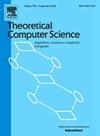Generalised Nyldon words
IF 1
4区 计算机科学
Q3 COMPUTER SCIENCE, THEORY & METHODS
引用次数: 0
Abstract
One of the most studied famous classes of words is the class of Lyndon words. Their studies are mainly motivated by the property that they factorise the free monoid as shown in the famous Chen-Fox-Lyndon Theorem. Several generalisations of Lyndon words as anti-Lyndon words, Nyldon words or inverse Lyndon words were made over time. In 2014, Grinberg introduced Nyldon words as a new perspective on the factorisation of the free monoid of words. In particular, for Nyldon words the famous Chen-Fox-Lyndon Theorem is considered w.r.t. a reversed lexicographical order, i.e., a lexicographically non-decreasing factorisation where each factor is smaller or equal than its successor. Further, a generalised lexicographical order is defined by equipping each position i in a word in with a total order on Σ. For combining the concept of a generalised order as for generalised Lyndon words and the class of Nyldon words, we investigate a non-decreasing factorisation of the free monoid w.r.t. this generalised ordering and introduce generalised Nyldon words. We show that those words even force a unique non-decreasing factorisation, form a right Hall set, and coincide with the anti-Lyndon words.
概括的尼登词
研究最多的著名词汇之一是林登词汇。他们的研究主要是由于他们分解了著名的Chen-Fox-Lyndon定理中所示的自由单群的性质。随着时间的推移,人们对林登词进行了几种概括,如反林登词、尼登词或逆林登词。2014年,Grinberg引入了Nyldon词,作为对词的自由单似体分解的新视角。特别是,对于Nyldon词,著名的Chen-Fox-Lyndon定理被认为是一个颠倒的字典顺序,即字典顺序上的非递减分解,其中每个因子都小于或等于它的后继因子。此外,通过在Σ上为单词中的每个位置i配备一个总顺序(total order)来定义广义字典顺序(generalized dictionographical order)。为了将广义Lyndon词的广义序的概念与Nyldon词的类别相结合,我们研究了自由单元的非递减分解,并引入了广义Nyldon词。我们证明了这些词甚至强制一个唯一的非递减分解,形成一个右霍尔集,并与反林登词重合。
本文章由计算机程序翻译,如有差异,请以英文原文为准。
求助全文
约1分钟内获得全文
求助全文
来源期刊

Theoretical Computer Science
工程技术-计算机:理论方法
CiteScore
2.60
自引率
18.20%
发文量
471
审稿时长
12.6 months
期刊介绍:
Theoretical Computer Science is mathematical and abstract in spirit, but it derives its motivation from practical and everyday computation. Its aim is to understand the nature of computation and, as a consequence of this understanding, provide more efficient methodologies. All papers introducing or studying mathematical, logic and formal concepts and methods are welcome, provided that their motivation is clearly drawn from the field of computing.
 求助内容:
求助内容: 应助结果提醒方式:
应助结果提醒方式:


